Vietnam: Celebrations and Festivals: What to do throughout a year?
- Bui Thi Thuy Dung
- Nov 22, 2017
- 8 min read
Vietnam – a beautiful South East Asian country, lying in the middle of the Pacific Ocean. Not many people know about it, and people knowing about it, they may only hear about its tourist attractions or exotic cuisine. But is it enough? I have to be honest: definitely a big no.
Coming to Vietnam, visitors have not only an opportunity to experience the signature dishes and places but also a chance to get acquaintance with its friendly and generous citizens. And the best way to achieve this goal is to join the inhabitants in their traditional celebrations and festivals occurring though out a year.
Lunar New Year (Tết Nguyên Đán)
The northern part of Vietnam was a part of Imperial China for over a thousand years, therefore, Vietnam was heavily influenced by Chinese culture, so these two countries have many similarities in tradition. The same as China, Tet Nguyen Dan, also known as Lunar New Year, is one of the most important festival in Vietnam. It is celebrated on the same day as Chinese New Year based on the Lunar Calendar (calculating both the earth's movement around the sun and the moon’s movement around the earth). Different from other Western countries, Vietnamese uses this kind of calendar for most of their traditional activities. Before the festival, people always clean up their houses and decorate them with several kinds of flower such as apricot, peach blossom, lily, orchids, and gladiolus.

Apricot
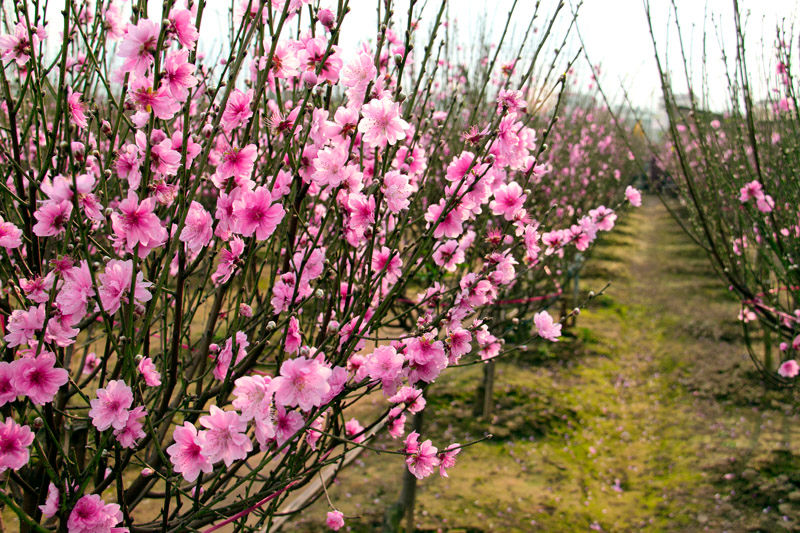
Peach blossom
During Tet Nguyen Dan, citizens perform many customs such as visiting a relative and friend’s houses, worship the ancestors, wishing New Year's greetings, giving lucky money in red envelopes to children and elderly people, and opening a new shop.
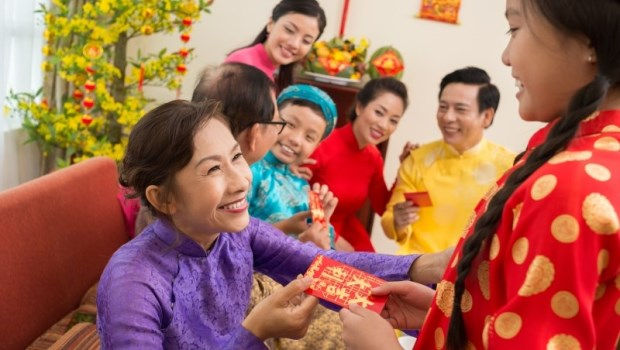
A grandma is giving her grandchild lucky money
This is also a great occasion for family reunion, which is extremely meaningful especially for people living far from their families to gather and eat several signature dishes such as Banh Chung, Banh Giay, and Gio Thu.
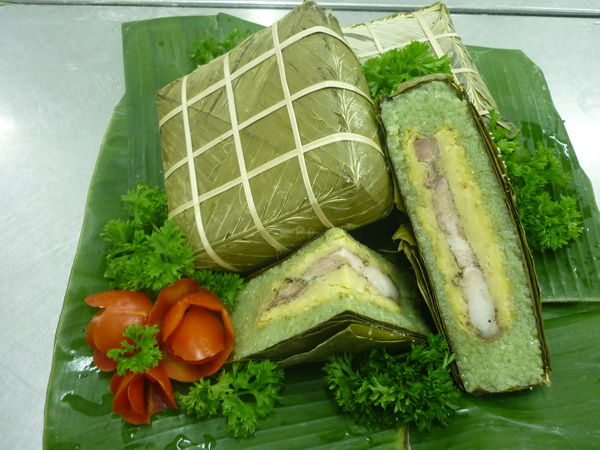
Banh chung (Traditional dishes)

Banh giay (Traditional dishes)
Hung King’s death anniversary (Giỗ Tổ Hùng Vương)
Vietnamese people always respect and remember their origins and ancestors. Therefore, annually, on the tenth of March of Lunar Calendar, Vietnamese people, not only at home but also abroad, turn their souls and hearts back to Nghia Linh Mountain in Viet Tri City, Phu Tho Province, the land where Hung Kings established the country centuries ago, to join in The Death anniversary of the Hung Kings, also known as Hung King Temple Festival. Hung Kings were the ancient leaders who made great contribution in building the country in its very first start. Celebrating Hung King’s death anniversary is a great occasion for educating the young generation of Vietnam society about their ancient root, teaching them to always remember their families and who has helped them.
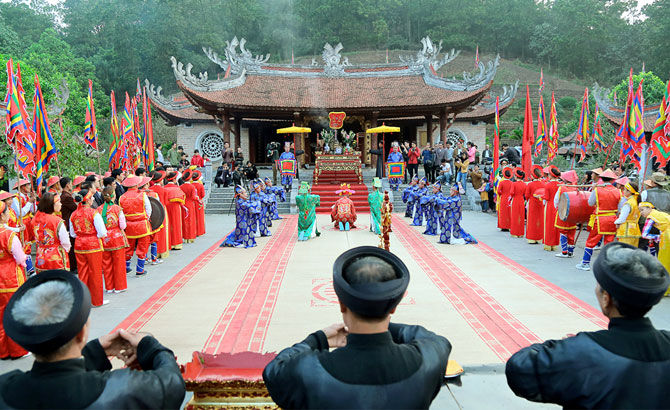
The main worship services
A day before the festival, ancient and modern flags are hung along the road leading from the city to the Hung mountain. During the festival, 100 flying lights are released into the night sky, creating a magnificent scenery. The main worship service is held in earnest of the following morning, the 10th of March, beginning with a flower ceremony. There are also several marches in the ceremony such as the elephant march, the procession chair, and other activities like cross-bow shooting, rice cooking, swinging contests, cock fighting, and dragon dancing.
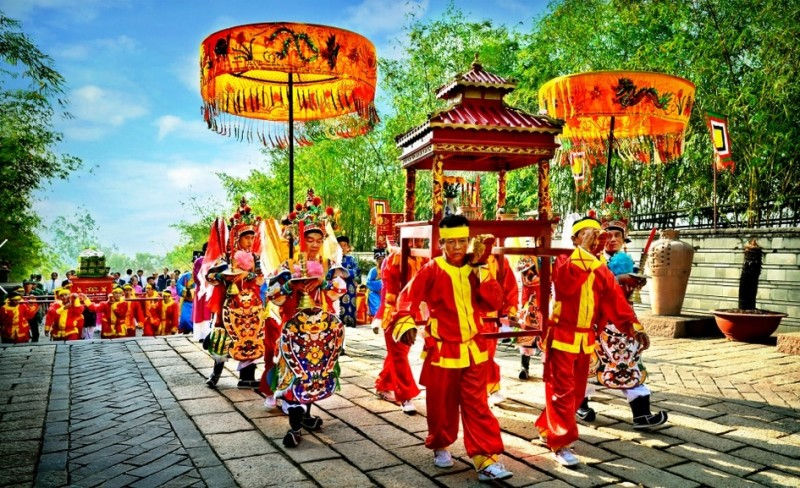
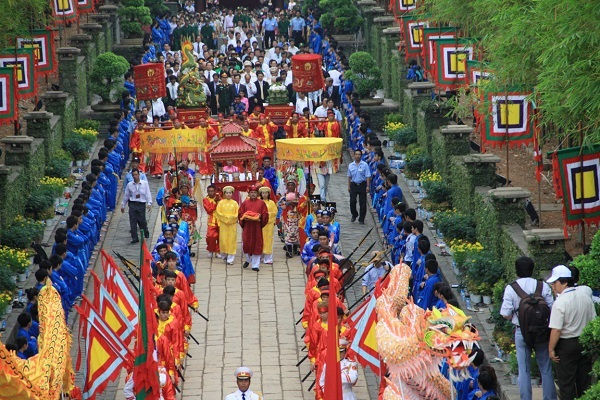
Marches in Hung king's temple
Huong Pagoda festival (Hội chùa Hương)
Huong Pagoda Festival is one of the greatest Buddhist festivals in northern part of Vietnam, playing an important role in the spiritual life of Vietnamese people and Vietnamese Buddhists. The official opening day for the festival is on the 6th day of the first Lunar month, and then lasts for three months later. Huong Pagoda is in My Duc District, 70 kilometers away from Hanoi to the south. According to folk story, this occasion is for Dieu Hien princess, who had practiced Buddhist for 9 years and got enlightened. She saved the country from the war, protected her parents and sisters from devils even though she had been jailed for not accepting the arranged married by her father. From then on, she was canonized as Goddess of Mercy (Quan The Am Bo Tat) and was widely worshipped throughout the country.

Huong Pagoda

Huong Pagoda festival
Coming to Huong Pagoda Festival, tourists have chance to taste three most famous valuable dishes: bamboo shoot, vegetables and grinding roots, presenting traditional cuisine and the pure in Buddhism. People will also be overwhelmed by apricot flowers covering the Huong Son mountain; and when festival is nearly over, they will also have a chance to drink the delicious fresh flavor of apricot juice. Overall, Huong pagoda festival is a traditional and interesting national occasion to honor the Truth, Beauty, and Goodness, encouraging people to follow these positive characteristics in their daily life.

Dragon dancing
Buddha’s Birthday Festival (Đại Lễ Phật Đản)
Buddhism is a big religion in Vietnam, therefore, Buddha’s Birthday, also known as Vesākha or Vesak, is considered as one of the most significant festival in Vietnamese tradition. It is said that this is the day Buddha achieved enlightenment after a long time of Buddhist practice. This occasion takes place on the 15th of April based on the Lunar Calendar. Many temples around the country are decorated magnificently while the monks walk in processions along the streets, and all the pagodas are beautified with attractive colorful lanterns.
The smell of incense permeates everywhere, adding to the festival’s spiritual nature. All the visitors will gather in front of the pagodas to observe the religious rites and listen to the Vesak meaningful message, as well as the special speech given by the head monk of the pagoda to instruct citizens with the beauty and positive moral of Buddhism. After that, free food and gifts will be offered to children and the poor.
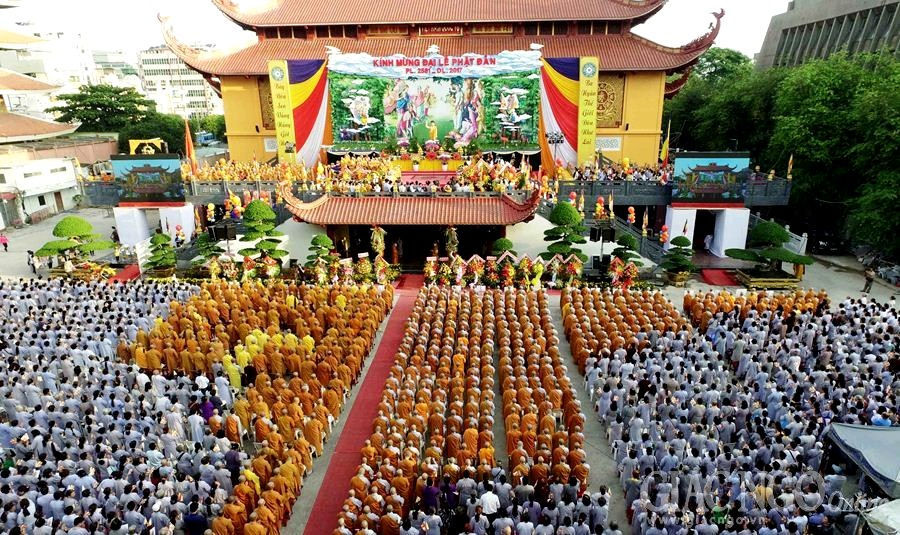
Citizens gathering to celebrate the festival

Monks in the festival
Hoi An city in the middle of Vietnam is known as the best place to enjoy this festival. Especially in the night, the atmosphere of the festival gets even more exciting. There is a parade that starts from the Phap Bao pagoda and goes along the main road of the old quarter, ending at the river. Animals are set free, people also let flower garlands and colored lanterns flow on the river and let them flow in order to warm up the wandering souls who have died drowning.

Flower garlands and colored lanterns
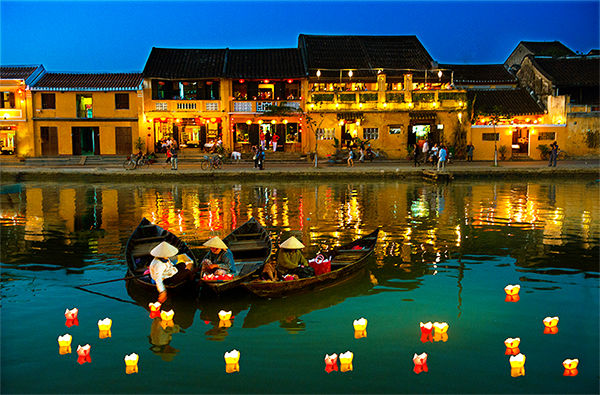
Hoi An
Elephant Racing Festival (Hội Đua Voi)
To those who live in Tay Nguyen highland, Vietnam, elephant is their most precious animal. This wild animal has become a close friend with human, helping them in working, transporting, and traveling. Elephants are most known for its loyalty and strength since during the time Vietnam was invaded by Chinese feudal system, they were inhabitants’s partners together fighting for the country. They take a significant role in Vietnam’s folklore and music, becoming familiar to children and adults.
Therefore, Elephant Racing Festival, one of the biggest festivals in Tay Nguyen, is held annually in the third lunar month based on the Lunar Calendar in order to express the connection between human beings and this adorable creature. On this special day, elephants from several villages will gather at Don Village (Ban Don) to participate in the competition. In each round, ten elephants will run at the same time for about one or two kilometers on a broad and large road. The competition is guided by the sound of tu va, a kind of horn in Vietnam. The first elephant reaching the final destination will receive a laurel wreath as a sign of victory, and it will be treated with sugar canes and bananas from surrounding people.
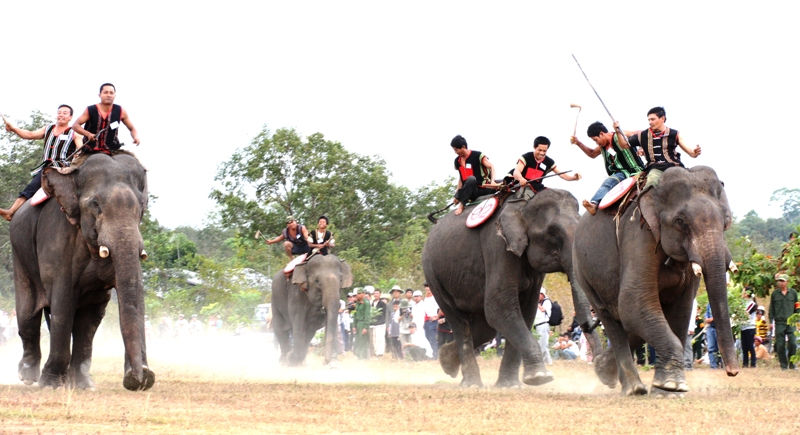
Elephant racing
After finishing the race at Don Village, the elephants move to Serepok River for another competition: swimming. They also participate in games like football and tug of war. At the end of the festive, all festival participants mass at Ban Don’s community house for feasting, drinking stem wine, and dancing together.
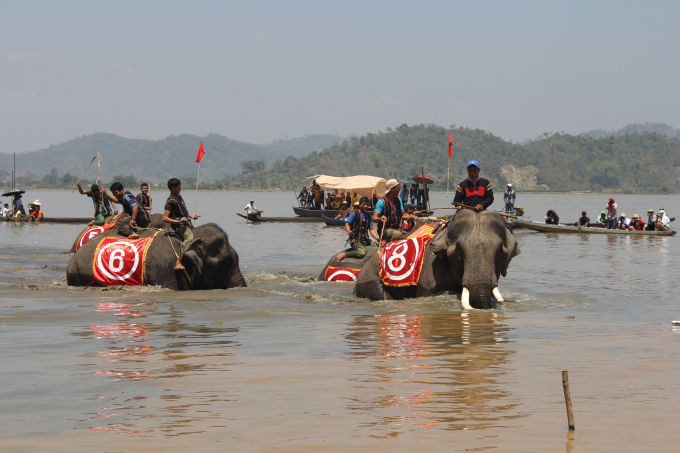
Swimming contest
Independence Day (Lễ Quốc Khánh)
To any country, Independence Day is an important historical, political or cultural event associated with its peace, marking the time that they are free from wars. In most nations, this holiday originally leads to the birth of the country.
Similarly, in Vietnam, the origin of this day tracks back to the year of 1945. On September 2nd, 1945, tons of Vietnamese people gathered at Ba Dinh Square, Hanoi to listen to the Declaration of Independence prepared and read by Ho Chi Minh, also known as Uncle Ho, the first President of Vietnam. This ceremony officially stated that Vietnam was free from French’s colonial force, which had been started from the 19th century. However, in the following year, Vietnam was continue to be invaded by America’s government. And after taking back the country from The United States of America’s control in 1970s, in the First National Meeting of Vietnamese Communist Party, the government decided to choose the 2nd of September to be the Independence Day of Vietnam.

Flags are hung in front of Vietnamese's houses.
There are a wide range of activities can be found in the Independence Day of Vietnam such as fireworks in the sky and marches. Because all citizens are free from school and work on this day, they usually take journeys to other places or to other countries, relaxing after hard – working time with family members.


Firework in Ho Chi Minh city
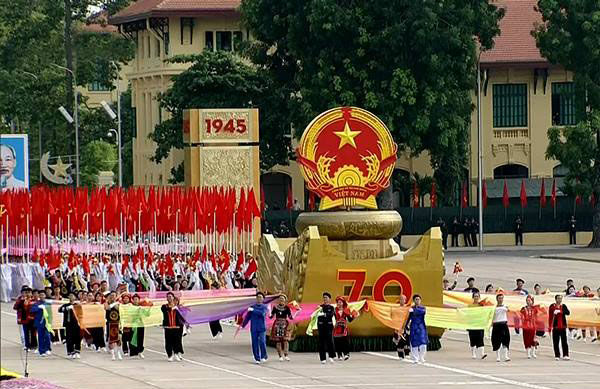

Parade in Hanoi - the capital of Vietnam
Mid – Autumn Festival (Trung Thu)
Mid – Autumn (Trung Thu) is the day when the moon is at its brightest in a whole year. In that spirit, to worship the Moon Genie, people annually organizes the celebration of Mid-Autumn's Festival on the 15th of August according to Lunar Calendar.
According to ancient story, this holiday is celebrated based on the occasion when an Emperor of Duong (Tang) Dynasty in China called Duong Minh Hoang was taken to the moon by a wizard named La Cong Vien. In the middle of his trip to the moon, the Emperor caught a group of fairies in heaven celebrating the full moon with many interesting activities. When the king came back to earth, he taught his citizens about the celebration and made it become a custom lasting through many years. Mid-Autumn’s Festival gradually becomes an event providing children with a rich diversity of delightful traditional games and entertaining activities, promoting education as well as culture.
On this day, the kids will go around their villages together, singing songs about the festival and bringing along a special kind of toy with them. That toy is called Den Trung Thu in Vietnamese. In the past, it was made from paper with several shapes such as a start, a fish, a roster, or a butterfly, lighting with a small candle inside, however, nowadays, thanks to the development of technology, there is a new version of Den Trung Thu, which is made from plastic, running with electricity and music.

Traditional Den Trung Thu
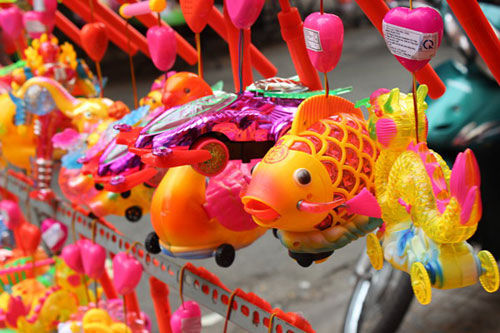
Electrical Den Trung Thu
Before the Holiday, moon cakes, also known as Banh Trung Thu, made from sticky rice and colorful lanterns in different forms of star, boats, dragons, and so on are made to serve in the festival. On the special day, at night, mid-autumn festive parties with moon cakes, candies and fruits are held at every residential area. Moreover, traditional games like hide and seek, lantern marching, and lion dancing are organized for children to participate in and have fun together.
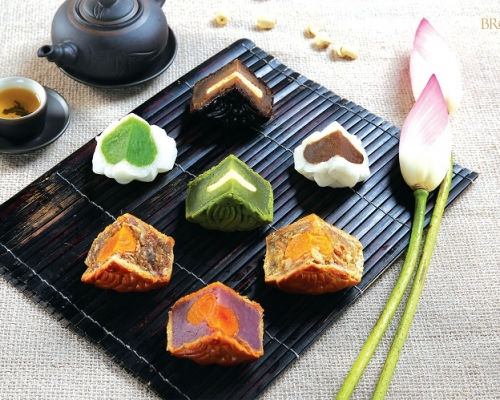

Banh Trung Thu (moon cake)
References
http://www.officeholidays.com/countries/vietnam/tet.php
https://www.vietnamtravelcenter.com/travel-guide/death-anniversary-of-the-hung-kings.html
https://www.vietnamtravelcenter.com/travel-guide/huong-pagoda-festival.html
http://hoian-tourism.com/the-heritage/hoi_an_festival/buddhas-birthday-festival-2
http://hoian-tourism.com/the-heritage/hoi_an_festival/buddhas-birthday-festival-2
https://www.vietnamtravelcenter.com/travel-guide/elephant-racing-festival.html
https://www.vietnamtravelcenter.com/travel-guide/independence-day.html
https://www.vietnamtravelcenter.com/travel-guide/mid-autumns-festival.html
http://www.vietnam-beauty.com/vietnamese-culture/festivals-and-ceremonies/15-festivals-and-ceremonies/111-hung-king-temple-festival-.html
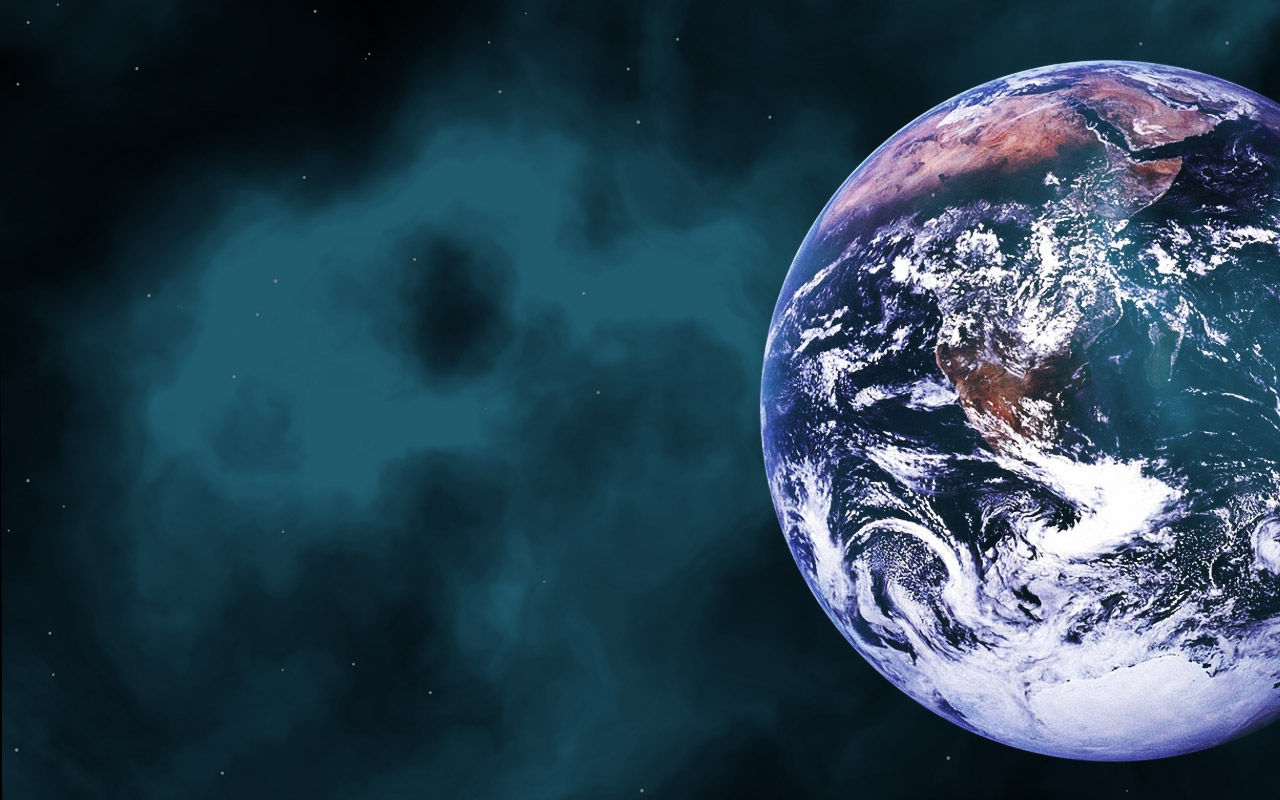

























Comments